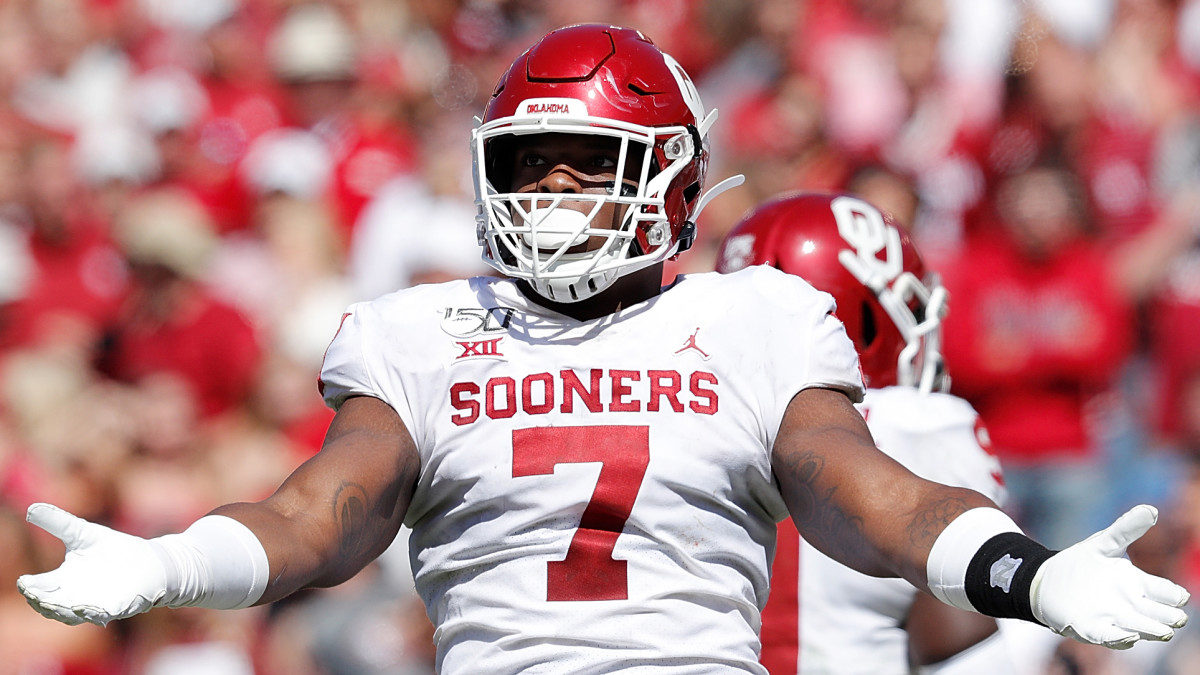Rhamondre Stevenson, Ronnie Perkins express frustrations, but both are ecstatic to be back
When Lincoln Riley announced to his team last week that running back Rhamondre Stevenson and defensive end Ronnie Perkins would play the next day at Texas Tech, the celebration in their Lubbock hotel space almost got out of hand.
“Yeah, it kind of turned into almost a little riot inside the meeting room,” Perkins said on a video press conference Wednesday, laughing as he recalled the scene. “So, there were a couple chairs flipped over, I had to shake a lot of hands, lot of hugs to give out. But it was a great feeling.”
“It was ecstatic in the room,” Stevenson said. “People were happy. We were pumped and we knew we had to go play a complete game the next day.”

Stevenson, Perkins and wide receiver Trejan Bridges were suspended for failed drug tests ahead of last year’s Peach Bowl — a 63-28 loss to eventual national champion LSU. Bridges’ suspension remains in limbo, Riley said, even though the penance of six games has been served.
Both reinstated players met with the media for the first time on Wednesday, and both Oklahoma captains also took questions on what amounted to their teammates’ 11-month suspensions and their triumphant returns last weekend.

Perkins, a junior from St. Louis, led the Sooners with two tackles for loss, while Stevenson, a senior from Las Vegas, scored three touchdowns, had 100 yards from scrimmage on just 14 touches and was named Big 12 co-offensive player of the week.
“That’s kind of what we expect out of Perk,” said co-captain and starting safety Pat Fields. “Perk’s been dominant since the first day he got here. A lot of people might be surprised that he looked so well, but I mean he’s been working so hard since the end of last year.”
“Having Rhamondre back is awesome,” said co-captain and center Creed Humphrey. “He's a great player. I really see him as an elite running back.”
Both Fields and Humphrey expressed frustrations with the whole episode, though the sources of those frustrations were different.
“Of course we were pretty upset with them in December,” Humphrey said, “but as far as anything (NCAA suspensions) dragging out like that, I don’t make the rules so I don’t really have any say in it.”
“Personally, I’m not so much a fan of the rule,” Fields said, “just because coach Riley has kind of mentioned it before — whenever we’re talking about them failing tests or whatever it is, we have to look at it not from disciplinary action, because if you just discipline them or suspend them or hold them out of games, but you don’t do anything to help them or seek out the reason for that, then what are you really doing to help the college athlete?
“And then, you know, if they’re looking from the perspective of them protecting us or acting in our best nature, I don’t think discipline and just discipline alone is very beneficial. I applaud coach Riley because he has completely changed his outlook on it. He’s gone well out of his way to make sure we’re getting all the help we deserve or we need and making sure we’re looking at things from a mental health perspective.”
Riley said last week his views — on marijuana, the NCAA’s rules against it and the often draconian punishments that follow — have completely changed.
“Yeah, it’s changed a ton,” Riley said. “I mean, probably 180 degrees in other direction. I grew up, and even as young coach, looking at it like, this is just a lazy, dumb thing that people do, and if they do they should get punished. I mean, that’s kind of how I was raised. That’s how I was raised as coach.
“And then, until I started really learning (that) for a lot of people – not saying everybody, but for a lot of people – this isn’t performance-enhancing, this isn’t party deal. For lot of people, it’s a major mental health issue. Major. And as I finally woke up and paid attention, with that realization in me finally being able to learn that and understand that — which took me too long, honestly — it shifted everything about how we handle that issue in our program. I’m very convinced we were totally handling it the wrong way.”
Both players were frustrated but fought to stay patient.
“I mean, as a person it was easy to get our heads scrambled,” Perkins said. “But really just trusted the process. Trusted coach Riley, trusted my team and the coaches were helping me stay locked in and I was trusting God. So, I really just I really just left it all in their hands, and whenever I was going to get my opportunity, I was going to be ready for it.”
“For me,” said Stevenson, “it was just staying focused and when my time came I just had to make the most out of it. As for the process, it was frustrating but I knew my time would come. I just had to wait it out and work hard, practice hard, go through all the motions like I was playing first game. Just had to wait until the six games were up.”
Fields applauded his teammates for their focus throughout the ordeal and their willingness to still help the team. Both Perkins and Stevenson are considered NFL prospects — and figure to gain ground in that arena when NFL scouts are officially able to fully evaluate them — but they’ve never wavered from being college athletes.
“You know, it’s just a difficult process,” Fields said. “It’s difficult for all of us. Those guys have been more than great in handling this whole thing. A lot of them had to put their pride aside. They go from being a starter and a guy who we look to make plays to going to scout team.
“For a lot of people – that’s part of football – but it takes a lot to put your pride aside, especially when you are dealing with not playing. You are going from a starter to a guy who is not playing at all. It’s extremely difficult to deal with mentally. Those guys have been more than ready with all that. I can’t say enough about them and how much I respect them. Not too many guys can do that.”
To get the latest OU posts as they happen, join the SI Sooners Community by clicking “Follow” at the top right corner of the page (mobile users can click the notifications bell icon), and follow SI Sooners on Twitter @All_Sooners.
